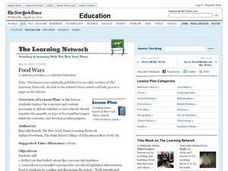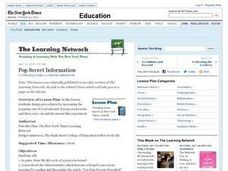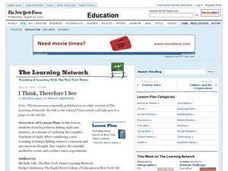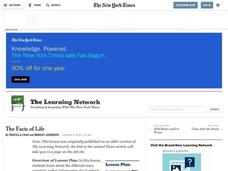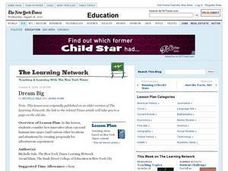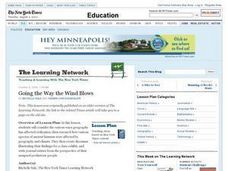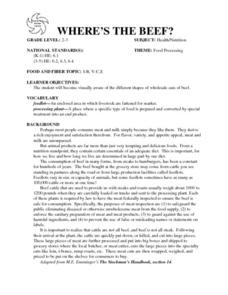Curated OER
Food Wars
Students investigate the debate whether schools should regulate the amount or type of food and drink students consume. They write and present position papers after reading an online NY Times article.
Curated OER
Invisible Enemy
Young scholars investigate parasites and the diseases they can cause and carry. They read and discuss an article, conduct research, and create a fictional studenT story about the parasite they researched.
Curated OER
Can You Dig It?
Students use a mock archaeological site to dig up artifacts. They read an article about artifacts found in Syria. They develop a list of artifacts that are related to specific sites in the community. They create an exhibition of these...
Curated OER
The Buzz about the Buzz
Students examine the content of popular energy drinks by conducting research about stimulants and sweeteners. They create posters outlining how these compounds affect consumers. They compare and contrast energy drinks with soft drinks...
Curated OER
Roy G. Biv Has Feelings Too
Young scholars test their memory recall and discuss its association to color. After reading an article, they discuss the natural and psycho-sociological significance of the color red. As a class, they participate in a mood-color...
Curated OER
What's All the Buzz About
Students participate in a game of charades to examine different animal behaviors. After reading an article, they discuss why bees waggle and how that behavior applies to humans. They research the behaviors of an animal of interest to...
Curated OER
A Hard Sell on Stem Cells?
Learners examine their prior knowledge of cell regeneration and therapeutic use of stem cells. After reading an article, they discover new techniques for deriving embryonic stem cells. In groups, they research on the different types of...
Curated OER
Pop Secret Information
Students design procedures for increasing the popping rate of a set amount of popcorn kernels. They propose and test a "secret" addition to the corn popping procedure which they expect would increase the popping rate and then write lab...
Curated OER
I Think, Therefore I See
Students participate in a memory experiment to discover how the eye works. After reading an article, they analyze a new technique which examines how the brain registers sight. They develop their own memory game and conduct trials using...
Curated OER
Eyeing the Next Einstein
Students complete a KWL chart on Albert Einstein. After they read an article, they discover more about his iconic status and how future scientists view him. In groups, they create trading cards about Einstein and another scientist of...
Curated OER
Shades of Gray
Young scholars examine their own strengths and weaknesses and try to determine if it is a result of nature, nuture or both. After reading an article, they discuss how gender may or may not account for differences in intelligence. They...
Curated OER
Discoveries of Titanic Proportions
Young scholars analyze various statements on the moon. After reading an article, they discuss the findings about a new moon around Saturn. In groups, they re-create a press conference in which the new findings were released to the...
Curated OER
The Facts of Life
Young scholars explore the different ways scientists gather information about extinct animals. They utilize these methods to create illustrated story books about a particular extinct animal.
Curated OER
A Site to See
Students identify the risks and benefits of living next to a volcano. After reading an article, they discuss the behaviors of an active volcano. Using the Internet, they work together to research volcano-monitoring techniques and create...
Curated OER
Dream Big
Young scholars discuss the success of privately built and flown space crafts by reading and discussing a news article. They develop adventure trip proposals to present to Sir Richard Branson. Students write essays reflecting on the...
Curated OER
Going the Way the Wind Blows
Students examine the cause and effect relationship between geography and ancient civilizations. After reading an article, they determine how new findings can help scientists examine the migration patterns of these civilizations. Using...
Curated OER
Waste Not, Want Not
Young scholars consider the types of debris that litters beaches and conduct research on waste management. They then interview professionals in a particular field of waste management and write reports for a booklet about garbage and...
Curated OER
A Glacier Ran Through It
Students learn basic geological concepts while researching how ice age floods sculpted the plateau of the Columbia Basin. They synthesize their learning by creating annotated illustrations of the geological principles they studied.
Curated OER
Connecting the Dots
Students consider familiar audio and imaging devices, researching and analyzing the differences between analog and digital versions. They then reflect on which versions of the technology provide a truer record over time.
Curated OER
Getting into Hot Water
Students discuss the effect of global warming on bodies of water after reading "An Icy Riddle as Big as Greenland" from The New York Times. Students work in groups to research topics related to global warming and Greenland's ecology...
Curated OER
Reaching New Heights
Students consider the impact of genetics on a person's intelligence and appearance. After reading an article, they examine the controversy over using human growth hormones. They debate the approval of using the hormone to increase the...
Curated OER
Mission Makeover
Students examine their prior knowledge of the space program. After reading an article, they explore the conclusions of the Columbia accident. In groups, they research various space programs and discover the scope of NASA. They write...
Curated OER
Plasma 101
Students examine the definitions and characteristics of plasma. After reading an article, they analyze new technologies to study plasma. In groups, they create a poster on how the different types of plasma work and write letters to their...
Curated OER
Where's The Beef
Students create and conduct a survey in the community to evaluate the demographics of vegetarians in the community. They compile data, create graphs, calculate percentages, and draw conclusions about the survey data. Students create an...


